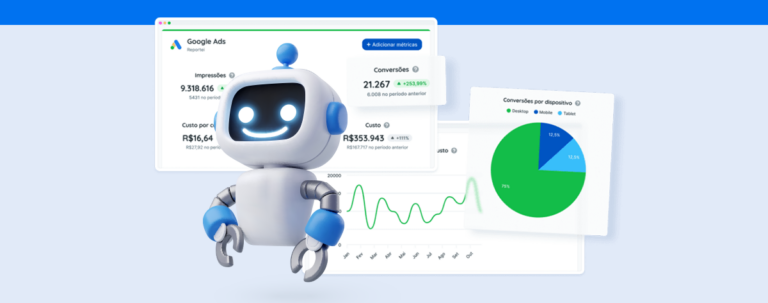Here’s how to use a Data-Driven Culture to make the best decisions for your business or clients
Data-Driven Culture has become more and more meaningful to businesses and marketing agencies, helping them make more strategic marketing decisions.
Using intuition or past results (whether positive or negative) to guide marketing actions is still popular among decision-makers. However, it is becoming increasingly ineffective. Data orientation has gained momentum, becoming a protagonist in successful business development.
Are you wondering how a data-driven culture can benefit your business or marketing agency? Keep reading to find out the benefits and how you can apply data-driven culture!
What is a Data-Driven Culture?
You’re probably already familiar with terms like Big Data, Business Intelligence, and Business Analytics. They define data analysis as the most strategic way to make decisions within a business or project.
These methods are used within data-driven culture, placing data at the center of business-related decisions. That means using reliable and relevant information to guide marketing actions and achieve successful results.
It’s no different when we apply that to marketing strategies. In the projects of a business or agency, metrics should be at the center of decision-making, as they are based on stats and intelligent analysis methods.
So, capturing Big Data is not enough. Businesses also need to know how to leverage collected data to gain the most relevant information (Right Data) for planning.
The most relevant information will, of course, depend on the marketing aims of each project. But a data-driven culture will give you reliable results when properly implemented and provide your client with a richer experience.
The benefits of a Data-Driven Culture in marketing
Whether your client aims to strengthen their brand, generate leads, or increase sales, data-driven culture can (and should) be used for making efficient marketing decisions. We’ll now talk about the advantages of using this method. Keep reading!
Decisions guided by data
The first and most valuable benefit of a data-driven culture is, no doubt, that it guides decisions based on data that has been collected and leveraged efficiently.
After all, using stats and reliable information to plan marketing actions can provide strategic insights that are in line with the aims of a project. Though ideas based on feeling may be tempting, there’s no guarantee they’ll work, is there?
Optimized processes
One effect of knowing where to look for data and how to leverage it for the best insights is optimizing the internal processes of a marketing agency or business.
You can stop spending time on ideas you aren’t sure will work and become more strategic in planning, executing, and even optimizing project-related investments.
Added value to your service or product
By making data-oriented decisions and optimizing processes, you will add to the value of the service or product you offer clients. Good results are linked to effective strategies.
As an example, let’s say you have analyzed data from Google Ads and decided to optimize your client’s investments in ads. Chances are those ads will have higher performance on the same budget.
Then, your biweekly or monthly digital marketing report will show that you increased the value of your work. You will have data to show how you extracted insights, how they contributed, and determine future processes.
Customized Strategies
With a data-driven culture, your ideas will be more in line with the business persona and its needs. That means you can customize strategies for every step of the buyer journey.
The result is that you can anticipate solutions and strengthen your connection with your target group, helping the brand stand out in the market and getting the right message to your ideal client.
How to implement a Data-Driven Culture in your business or agency
Now that you know how data-driven culture can benefit businesses and marketing agencies, it’s time to understand how to implement it alongside your team.
It may seem complex at first, but it all starts with planning, of course. Before moving on, you need to define how data will be collected and leveraged. That helps you organize processes to meet the needs of each project.
For example, good digital marketing software for reports is essential for more agility and practicality in analyzing data.
But besides implementing the data-driven-culture method and having platforms from which to capture data, your agency or business’ team must engage in data-driven reality fully. It’s no wonder the word ‘culture’ is part of this strategy’s name.
Besides learning to capture data and extract the best data-driven solutions, your team must be adequately trained in efficient analysis and planning meaningful actions for each project.
For a data-driven culture to be effective, it shouldn’t be limited to marketing decisions. Data must be aligned with the sales department as well as other important departments of a business.
That way, the entire business can be developed using data, in healthier, more efficient way as a result.





